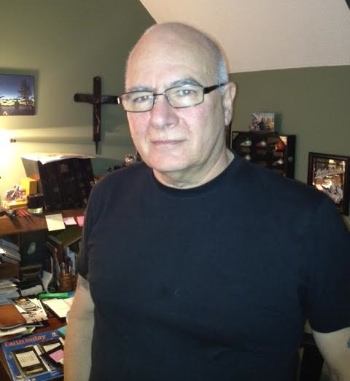
Bill Wong is a chaplain at this auto dealership – as well as a machine shop, a testing laboratory, some trucking firms and a farm.
Bill Wong keeps in close touch with people working in a machine shop, an auto dealership, a testing laboratory, some trucking firms and a farm.
A diverse set of clients, he admits, but the work he does in each working cluster is the same. He is a chaplain, bringing pastoral care and relationship-building services – hopefully with a congenial and sensitive approach – to the employees in each of the workplaces he frequents.
Educated and professionally involved as an engineer earlier in life, Bill began working as a corporate chaplain a decade or so ago, after a theological study stint at Regent College.
For some years, he worked under the umbrella of City in Focus. More recently, that ministry has scaled back its chaplaincy administrative services, so now he works under the aegis of Corporate Chaplains Canada (CCC), part of Outreach Canada, which is based in Delta.
 Bill says a typical chaplaincy arrangement involves a contract between the company and the chaplain, through CCC. The contract covers about 10 percent of the cost of a chaplain’s office and expenses. CCC and the chaplain work together to find support for the rest of the program, with CCC providing charitable receipting services as required. The contract with a particular company is worked out the firm’s Employee Assistance Program.
Bill says a typical chaplaincy arrangement involves a contract between the company and the chaplain, through CCC. The contract covers about 10 percent of the cost of a chaplain’s office and expenses. CCC and the chaplain work together to find support for the rest of the program, with CCC providing charitable receipting services as required. The contract with a particular company is worked out the firm’s Employee Assistance Program.
Does the fund-raising impact on the providing of services? Bill notes that “it can be a distraction,” adding that in his case, “I am fortunate because the church I am a part of [Vancouver Chinese Alliance] has been very supportive.”
One of the reasons for that support, Bill says, is that the church sees him as a “local missionary” communicating with and serving people who “may not have any other means of contact with a church.”
“Statistics show that only six per cent of people [in the Vancouver area] ever step inside a church.” That said, it is CCC policy not to proselytize, which means that faith-sharing opportunities can come only at the request of the employee with whom the chaplain is communicating.
“The Spirit gives opportunity to share,” he reports optimistically, providing a “case study” demonstrating “how the Holy Spirit opens doors and gives us the opportunity to share our faith, even when, as chaplains, we are not permitted to proselytize”:
When I first started serving at a workplace, I came to a fellow from India. He spoke very fluent English, and after our usual introductions, he asked me out of the blue: “Bill, are you going to the Joel Osteen event over at Roger’s Arena this coming Saturday?”
I said, “No, I’m not. So do you have a Christian faith?”
He responded, “No, I don’t, but I’m searching. I heard that Joel is a great speaker. I’m even bringing my father, who has a Sikh faith.”
“That’s really great. I hope you enjoy it. Please tell me more about the event next week.”
The following week, I met the fellow again, and he shared about the event and how he and his dad enjoyed it. Since then, we have been able to exchange our thoughts about the Christian faith. I also found out that he is also going to church occasionally as well.
CCC’s website provides a list of the services provided to a company and its employees. It reads thus:
We seek to provide continual care to you, your employees, and their families at the lowest rates possible. The following are typical services we provide:
- Custom Employee Care Programs
- Qualified Caring Chaplains
- 24 / 7 / 365 Crisis Care
- Workplace-Based Assistance
- Male and Female Chaplain Teams
- Addictions Support
- Bereavement Care & Funerals
- Marriage Preparation & Weddings
- Stress Reduction Strategies
- Suicide Intervention
- Hospital and Prison Visitations
- Specialized Referrals
- Customized Workshops
- Permission-based Spiritual Care
- Life Coaching and Prayer Support
- Strict Confidentiality
Terry Mahoney is the national director of Corporate Chaplains Canada, the structure under which Bill Wong and 14 other chaplains in British Columbia, Alberta and Ontario do their work.
Terry comes from a business and media background, having worked in the Okanagan for 35 years as both a television station executive and associate publisher of an outdoor magazine. A spiritual column he wrote attracted the attention of the people who developed Now TV, a Surrey Christian television station started by New Day Ministries several years ago. He helped transition the station over to Rogers ownership. It was eventually acquired by Vision TV and continues operation on Channel 10.
Then, given his enthusiasm for biking, Terry developed a Bikers Church as a spinoff of Christian Life Assembly in Langley. It was that work that got him interested in finding ways for plugging into a specific community – biking, in his case – and eventually led him into corporate chaplaincy work.
His Biker Church experience provided a good base for his future in corporate chaplaincy. At first, much of the work involved attending biker rides and getting involved in community life. That led to ministry-type opportunities such as officiating at weddings and funerals, all of which helped to build relationships that would lead to service or pastoral links.
Much of his work involves building confidence. That often involves the chaplain “subsidizing” his own work. In Terry’s case, that comes through the fact that he is in his sixties and, with his spouse’s approval, is able to put some of his retirement income into the project.
He admits that “it takes time to build honest, open and authentic relationships. It is not something you jump into.” Church leaders need to understand that “you don’t necessarily count success by number of conversions. It is a ministry of presence.”
While Terry refers to the idea that contemporary society has become less receptive to Christianity, he takes note, also, of one statistic claiming that only 2.7 percent of the working population is completely atheistic.
“The rest of [the working world] is seeking the Creator. That covers every religion.”
Terry cites St. Paul’s sermon (Acts 17: 16-34), delivered from Mars Hill in first century Athens. “Paul took note that the Greeks were a ‘godly people’ who gave recognition by having an altar with the inscription ‘To an unknown God.’”
Terry said that Paul told the Greeks: “You don’t know who he is. I know,” before introducing them to the One who God raised from the dead.
The key to building acceptance, without having any “hidden agendas,” Terry says, is emulate Paul in showing that “profound respect is created lovingly through recognition of a ‘God on purpose, with a purpose.’ Those we reach,” he said, “are equal to us in eyes of God. They, like us, are seeking.”


I know two of the chaplains personally and they are great